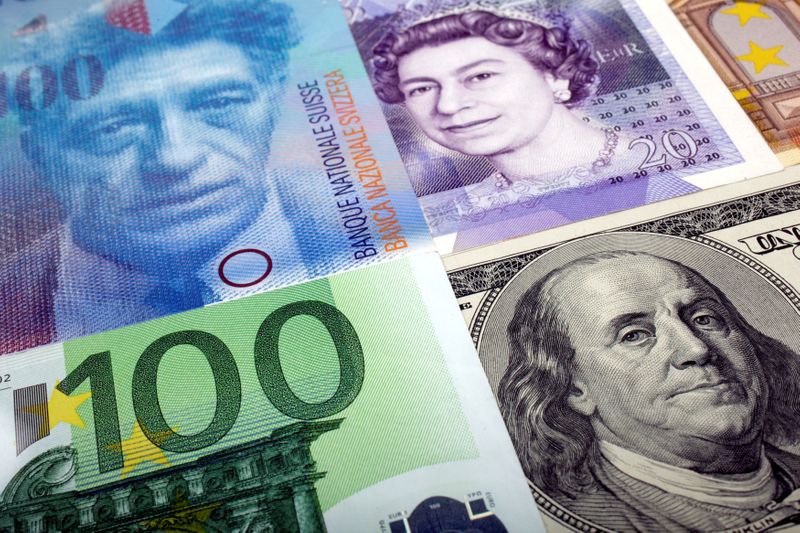NEW YORK (Reuters) – The safe-haven yen and Swiss Franc gained on Tuesday, with risk appetite plummeting, as investors grew nervous about a suddenly hawkish Federal Reserve that could deliver aggressive rate hikes and derail a nascent economic recovery.
Worries about the new Omicron coronavirus variant also kept a bid in these safe-haven currencies.
The dollar, on the other hand, retreated on Tuesday after rising when Fed Chair Jerome Powell said the risk of inflation had increased and suggested retiring the term “transitory” to describe the surge in prices. He also pushed for accelerating the tapering of Fed asset purchases.
His comments suggested an urgency to undertake quick monetary policy action that financial markets may not be prepared for, analysts said.
“Overall, the risks to the short-term outlook keep on growing. Investors have always viewed the Fed as the safety net, but the Fed looks like its panicking here,” said Edward Moya, senior market analyst, at OANDA in New York.
“The Fed was wrong on inflation. And now it appears they’re going to rush tapering and quickly deliver rate hikes. And if the inflationary pressure remains, you could see an accelerated rate hike cycle that could threaten financial conditions.”
In late trading, the dollar fell 0.4% against the yen to 113.065 yen.
Against the Swiss franc, the dollar dropped 0.4% to 0.9185 francs.
The dollar index fell 0.3% to 95.90. It rallied earlier, while U.S. stocks fell, after Powell’s hawkish remarks.
“Traders are in ‘sell first and ask questions later’ mode,” said Karl Schamotta, chief market strategist at Cambridge Global Payments in Toronto.
Earlier, the yen and Swiss franc rose against the dollar, after Moderna’s CEO said the coronavirus vaccines will likely be less effective against the Omicron variant as they have been against other variants.
Adding to the fears, drugmaker Regeneron Pharmaceuticals Inc said on Tuesday its COVID-19 antibody treatment could be less effective against Omicron.
The warnings reinforced a view that the global economy could take longer to return to pre-pandemic levels than many had been expecting.
Against the U.S. dollar, the euro rose 0.4% to$1.1335, posting its biggest three-day rising streak since December 2020.
Prior to Omicron’s arrival, the main driver of currency moves was how traders perceived the different speeds at which global central banks would end pandemic-era stimulus and raise interest rates as they looked to combat rising inflation without choking off growth.
Cryptocurrencies also had a volatile trading session. Ethereum was last up 4.8% at $4,668. Bitcoin was down 0.3% at $57,645.
Graphic: World FX rates https://graphics.reuters.com/GLOBAL-CURRENCIES-PERFORMANCE/0100301V041/index.html
Currency bid prices at 4:11PM (2111 GMT)
Description RIC Last U.S. Close Pct Change YTD Pct High Bid Low Bid
Previous Change
Session
Dollar index 95.8590 96.1990 -0.34% 6.532% +96.6470 +95.5440
Euro/Dollar $1.1340 $1.1293 +0.44% -7.17% +$1.1387 +$1.1235
Dollar/Yen 113.0350 113.5300 -0.45% +9.38% +113.8900 +112.5350
Euro/Yen 128.19 128.19 +0.00% +1.00% +128.6000 +127.6500
Dollar/Swiss 0.9181 0.9227 -0.49% +3.78% +0.9266 +0.9158
Sterling/Dollar $1.3306 $1.3318 -0.06% -2.58% +$1.3370 +$1.3195
Dollar/Canadian 1.2775 1.2738 +0.29% +0.32% +1.2837 +1.2732
Aussie/Dollar $0.7130 $0.7143 -0.19% -7.32% +$0.7170 +$0.7063
Euro/Swiss 1.0411 1.0418 -0.07% -3.66% +1.0444 +1.0391
Euro/Sterling 0.8520 0.8477 +0.51% -4.67% +0.8538 +0.8474
NZ $0.6827 $0.6825 +0.02% -4.94% +$0.6856 +$0.6773
Dollar/Dollar
Dollar/Norway 9.0360 9.0455 -0.12% +5.21% +9.1260 +9.0080
Euro/Norway 10.2458 10.1786 +0.66% -2.11% +10.3158 +10.1737
Dollar/Sweden 9.0179 9.0594 -0.06% +10.02% +9.1103 +9.0069
Euro/Sweden 10.2270 10.2336 -0.06% +1.49% +10.3036 +10.2077
(Reporting by Caroline Valetkevitch and Gertrude Chavez-Dreyfuss; Additional reporting by Saikat Chatterjee in London; Editing by Bernadette Baum and David Gregorio)





















